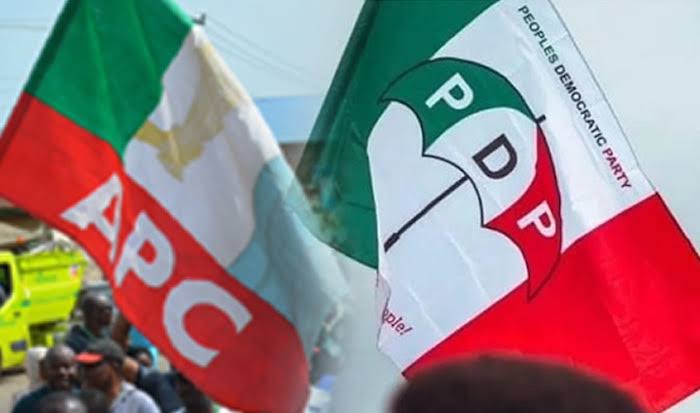OPINION

JEFF OKOROAFOR CRITIQUES APC'S FINANCIAL INDUCEMENT STRATEGY FOR UNDERMINING NIGERIA'S DEMOCRATIC VALUES
In the heart of Nigeria’s political landscape, a troubling trend has emerged—one that threatens the very foundations of the nation’s democracy. The normalization of financial inducements in political defections has become an insidious practice, undermining the integrity of political competition and sowing discord within the democratic process. As Nigeria’s political arena becomes increasingly transactional, with politicians shifting allegiances for financial gain, the nation finds itself at a crossroads where loyalty to principles is being overshadowed by loyalty to personal enrichment.
A Shifting Political Landscape
Nigeria’s political landscape has always been dynamic, with parties constantly evolving and strategizing to gain an upper hand. However, the ruling All Progressives Congress (APC) appears to be shifting its strategy in a more troubling direction. The APC has been accused of using financial incentives to lure prominent members of the opposition Peoples Democratic Party (PDP) into defecting. While political defections are not inherently undemocratic, the overt use of monetary inducements to engineer such shifts raises profound ethical and systemic concerns.
This development has sparked growing fears that Nigeria’s political system is evolving into one where power is no longer decided through genuine ideological competition, but through financial coercion and elite bargaining. Rather than prioritizing public service, the focus has shifted toward personal enrichment, eroding the very essence of democratic governance.
The Pattern of Defections
The frequency with which high-profile figures from the PDP have defected to the APC is now impossible to ignore. Governors, senators, and influential party leaders have all made the transition, often citing vague justifications such as “national unity” or “progressive alignment.” However, behind these seemingly altruistic motivations lies a different reality. Reports have surfaced suggesting that many of these defections are the result of discreet negotiations involving substantial financial rewards, promises of political appointments, and assurances of immunity from accountability processes.
One of the most notable cases involved a sitting PDP governor’s sudden defection to the APC last year. The move was widely perceived as a result of behind-the-scenes negotiations, in which federal concessions and personal financial benefits played a central role. Likewise, the sudden departure of several National Assembly members from the PDP to the APC has only fueled suspicions that financial incentives, rather than ideological alignment, were at play.
The Erosion of Ideological Competition
At the heart of any functional democracy lies the concept of robust ideological competition—where differing policy visions are openly debated and scrutinized. However, when politicians switch parties solely for monetary gain, the political landscape degenerates into a mercenary enterprise, where principles are secondary to patronage. The once-clear distinctions between the APC and PDP, representing opposing governance approaches, are rapidly being eroded as the lines between the parties blur, leaving voters with increasingly hollow choices.
The consequence of this transactional approach to politics is a weakened opposition. A healthy, vibrant opposition is essential for holding the government accountable and ensuring balanced governance. By absorbing opposition figures through financial incentives, the APC is effectively neutralizing dissent and consolidating power. This risks entrenching a de facto one-party system, where elections become mere formalities rather than genuine contests of ideas and policies.
The Normalization of Corruption and Public Disillusionment
Perhaps one of the most dangerous consequences of this trend is the normalization of corruption. When politicians are openly rewarded for abandoning their parties, it reinforces the perception that politics is a lucrative business, not a service to the public. The practice sends a stark message to ordinary citizens—that loyalty to principles is secondary to loyalty to wealth and power.
This growing cynicism is contributing to a widespread sense of disillusionment among the electorate. As Nigerians witness their representatives prioritizing personal gain over the needs of their constituencies, voter apathy and disengagement are becoming increasingly common. The erosion of public trust in the political system weakens democratic participation and undermines the social contract that is essential for a thriving democracy.
APC’s Strategic Calculations and the Future of Nigerian Politics
The APC’s strategy of co-opting opposition figures through financial inducements is clear: consolidate power and suppress dissent ahead of future elections. By dismantling the opposition and neutralizing key political players, the APC is creating a political landscape that is increasingly favorable to its agenda. However, this approach comes at a significant cost. The focus on political engineering and power consolidation distracts from the urgent need to address Nigeria’s pressing national challenges, such as economic instability, insecurity, and poor governance.
A Call for Reform
Addressing the rise of financial inducements in political defections requires urgent action. First, Nigeria must strengthen its anti-defection laws, imposing stricter penalties on unjustified cross-carpeting. Increased transparency in party financing is also essential, with more rigorous scrutiny of party funding and expenditures to expose any illicit inducements. Furthermore, civil society organizations and the media must play a more active role in holding defectors accountable, ensuring that the public is fully aware of the ethical breaches that undermine the democratic process.
The Stakes for Nigeria’s Democracy
The normalization of financial inducements in political defections poses a serious threat to the future of Nigeria’s democracy. If left unchecked, this practice will further entrench a political system where power is maintained not through genuine public endorsement, but through coercion and elite bargaining. The Nigerian people must demand a higher standard of political conduct—one where loyalty to principles outweighs loyalty to personal gain. The survival of Nigeria’s democracy hinges on the nation’s ability to address this growing crisis and restore the integrity of its political processes.
"This represents a significant development in our ongoing coverage of current events."— Editorial Board









